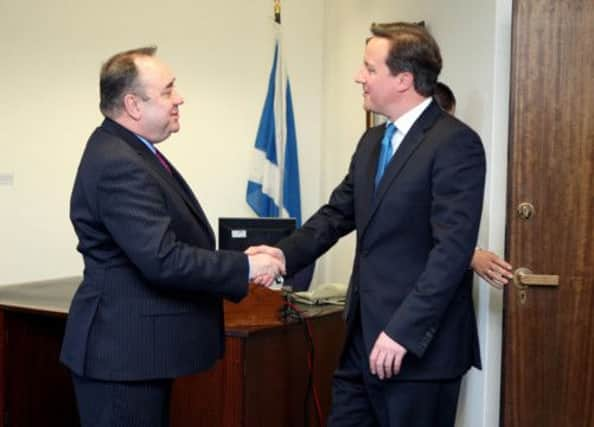Scottish independence: SNP call for budget clarity


The First Minister has written to David Cameron after suggestions Scotland’s budget could be cut by up to £4 billion, or £1,600 per taxpayer, in the event of a No vote.
His letter has been sent following a report by the estminster All-Party Parliamentary Taxation Group (APTG), which called for the replacement of the Barnett formula, the mechanism which determines how much cash Scotland receives from the UK Treasury.
Advertisement
Hide AdAdvertisement
Hide AdGerald Holtham, chairman of the Independent Commission on Funding and Finance for Wales, reacted to the report by suggesting that reviewing the Barnett formula could see Scotland getting as much as £4bn less then it does now.
Salmond called for clarity on what a No vote means for Scotland’s finances after his government published its plans for independence in its 649-page White Paper, “Scotland’s Future”.
The APTG report argued that the Barnett formula, which gives the devolved administrations a proportionate share of spending on “comparable” functions in England when their populations are compared, should be replaced with a system based on needs.
Critics of the Barnett formula have claimed that it is too generous towards Scotland, with more public money going north of the Border per head of population than to other parts of the UK.
It states: “In the case of a No vote, the Barnett formula must be replaced as a priority, with a needs-based formula for inter-regional resource allocation the best alternative, using the indicators of relative need identified by the Holtham Commission.”
Among the factors that would determine the amount of funding received by Scotland and the other devolved countries of Wales and Northern Ireland would be: the number of children, the number of older people, ethnicity, poverty and ill health.
The APTG has called on both sides of the debate to provide “the best information available about the ramifications of either outcome” in the referendum.
Salmond’s letter asked Cameron to challenge the perception that “Scotland takes more than its share of funds” from the UK.
Advertisement
Hide AdAdvertisement
Hide AdHe demanded a guarantee that Scotland’s budget will not be cut if the country votes No and that the Barnett formula will not be reviewed.
Salmond also repeated his call for a public debate between the Prime Minister and himself.
He said: “So that people understand the consequences of a No vote, I would be grateful if you would give a guarantee that no future Westminster government will scrap or review the Barnett formula or cut Scotland’s share of spending.
“Conservative MPs in particular have been vocal in their demands for spending in Scotland to be cut.
“This is despite the fact that for every one of the last 32 years Scotland has contributed more in tax per head than the UK and that in the five years to 2011-12 Scotland has enjoyed a relative surplus compared to the UK of £12.6bn.”
Salmond added: “The implications of this devastating report for Scotland’s public finances in the event of a No vote could not be clearer.
“It is now surely time for you and I to debate these and other matters in order that voters in Scotland can judge the arguments for themselves.”
A UK government spokesperson said: “The biggest risk to the fiscal security of Scotland comes from independence. It is the SNP which wants to scrap Scotland’s favourable funding formula by taking Scotland out of the UK.
Advertisement
Hide AdAdvertisement
Hide Ad“Experts from the Institute for Fiscal Studies have confirmed a funding gap of £3bn even on the most optimistic scenario for an independent Scotland’s economy.
“This means a Yes vote could cost families £2,000 every year.
“Our focus is on growing the economy and securing the recovery for the good of the whole of the UK.”